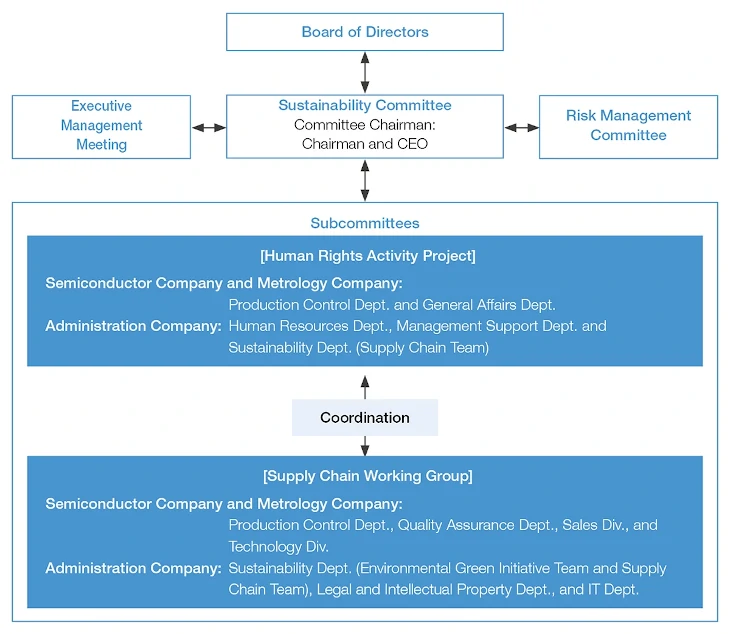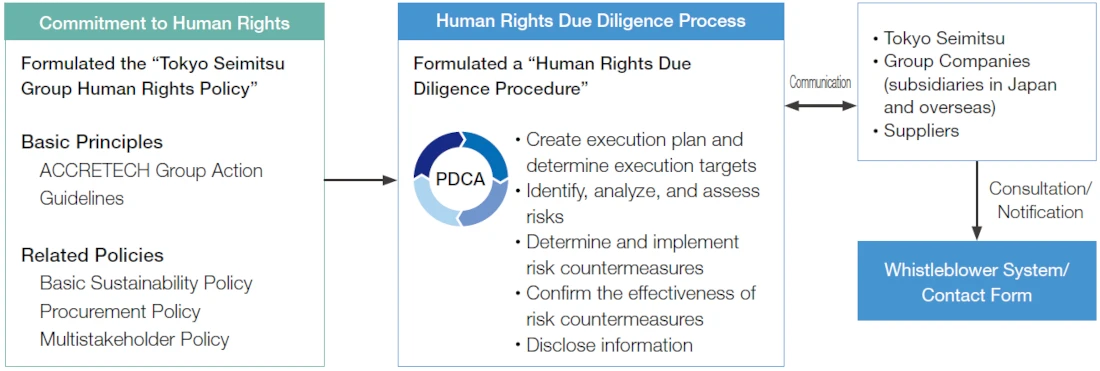Respect for Human Rights
The Tokyo Seimitsu Group established the “Tokyo Seimitsu Group Human Rights Policy” on October 3, 2022 based on international guidelines such as the UN Guiding Principles on Business and Human Rights with the aim of realizing sustainable growth of our business and organization and a sustainable society by striving to correctly understand and recognize the laws and regulations, cultures, religions, and values of the countries and regions in which we operate.
Tokyo Seimitsu Group Human Rights Policy
1.
Basic views on human rights
The Tokyo Seimitsu Group respects the human rights of all the people belonging to all its stakeholders, including socially vulnerable people, without regard for the attributes of individuals such as gender and nationality. We also promote the creation of safe, healthy, and rewarding workplaces where each member of our diverse workforce can demonstrate their capabilities to the utmost.
2.
Support and respect for international human rights norms; compliance with local labor laws and regulations
The Tokyo Seimitsu Group supports and respects the internationally recognized “International Bill of Human Rights,” “the International Labor Organization (ILO) Declaration on Fundamental Principles and Rights at Work,” which sets forth core labor standards, and “the UN Guiding Principles on Business and Human Rights (UNGPs).” We will commit ourselves to a respect for human rights. We also fully comply with all labor-related laws in the regions in which we operate, respect the basic rights of workers, and do not infringe on them. Should there be any inconsistencies between the laws and regulations of a given country or region and internationally recognized human rights, the Tokyo Seimitsu Group will seek ways to respect international human rights principles while complying with local laws.
3.
Scope
The Policy shall apply to all executives and employees of the Tokyo Seimitsu Group. The Tokyo Seimitsu Group will actively require its business partners and other stakeholders in its supply chain, as well as other business associates, to understand and cooperate with the Policy.
4.
Prohibition of child labor and forced labor
The Tokyo Seimitsu Group prohibits the use of child and forced labor in all aspects of its business activities. We will also actively require our business partners and other stakeholders to understand and cooperate with the prohibition of child and forced labor.
5.
Prohibition of discrimination and acceptance of diversity
The Tokyo Seimitsu Group prohibits its executives and employees from discriminating against anyone based on his/her gender, age, nationality, ethnicity, race, mental or physical disability, sexual orientation, cultural, religious, ideological or political beliefs, origins, family background, etc., respects the personality and individuality of each individual, and embraces diversity. We will also actively require our business partners and other stakeholders to understand and cooperate with the prohibition of discrimination.
6.
Respect for freedom of association and right to collective bargaining
The Tokyo Seimitsu Group respects rights of its employees, including, but not limited to, freedom of association and right to collective bargaining, as well as other civil and political rights. The Tokyo Seimitsu Co., Ltd. and its domestic affiliates with organized labor unions conclude labor agreements with their respective labor unions and respect each other’s positions to establish orderly labor-management relationships and appropriate working conditions, to maintain a good relationship between both sides through faithful compliance and performance of the agreements. Those companies shall discuss managerial issues and labor-management issues at the labor-management conferences held between management and labor union officers to remedy any such issues.
7.
Prohibition of harassment
The Tokyo Seimitsu Group prohibits its executives and employees from behaving in a way that would offend the dignity of an individual or ignore the personality of an individual through such actions as harassment, slander, jokes, sexual advances, etc. based on gender, job, status, etc. (i.e., sexual harassment, workplace bullying, maternity harassment, etc.) and from engaging in any other form of harassment.
8.
Human rights due diligence and relief efforts
The Tokyo Seimitsu Group protects the human rights of its stakeholders through a mechanism of human rights due diligence which aims to identify, analyze, assess, prevent, and rectify adverse impacts on human rights, thereby promoting sustainable corporate activities. Should it be discovered that the Tokyo Seimitsu Group has caused, or was involved in, any adverse impact on human rights, it will take appropriate action to rectify and remedy the adverse impact.
9.
Education on human rights
To ensure that the Policy is effectively implemented throughout its business activities, the Tokyo Seimitsu Group makes this Policy known to all of its business partners and other stakeholders, continuously provides appropriate education to all of its executives and employees, and continuously strives to raise their awareness of human rights.
10.
Information disclosure and dialog
The Tokyo Seimitsu Group publicizes its commitment to respect human rights on its website, in its sustainability report, and in other media. We will continue to strengthen our commitment to a respect for human rights, through obtaining external professional advice on the Policy and initiatives based on it as necessary.
Chairman Hitoshi Yoshida
System for Promoting Human Rights
The Group has set respect for human rights as one of its materiality in pursuing the sustainability of its business and society. We have the “Human Rights Activities Working Group*” established as a subcommittee of the Sustainability Committee to build a system for human rights due diligence and manage business practices. Important human rights related matters are reported to the Board of Directors through the Sustainability Committee. In addition, initiatives for respecting human rights at supplier locations are carried out in cooperation with the “Supply Chain Working Group,” another Sustainability Committee subcommittee.
* Human Rights Working Group
The Human Rights Activity Project, established under the “Sustainability Committee” in fiscal 2022, will be renamed Human Rights Working Group in fiscal 2024, and we will further develop systems formulated through the Human Rights Activity Project to respect human rights through our business activities.

Key Activities in Fiscal 2024
In fiscal 2024, the working group convened six times.
For major activities, refer to “Sustainability Promotion Structure/FY2024 Subcommittees/Human Rights Activities Working Group.”
Human Rights Due Diligence
Based on the “Tokyo Seimitsu Group Human Rights Policy,” the Company started human rights due diligence initiatives in fiscal 2022 to identify, prevent, and remedy risks to human rights posed by the Group’s business activities, in accordance with the Responsible Business Alliance (RBA) Code of Conduct and the online Self-Assessment Questionnaire (SAQ).
In fiscal 2023, we formulated a human rights due diligence procedure that summarizes processes for assessing negative human rights impacts and identifying eight priority human rights issues while conducting human rights impact assessments based on the results of due diligence at our Company and Group companies.
In addition, as it is necessary to consider human rights in the supply chain, we held briefings for major suppliers and conducted human rights due diligence with the understanding and cooperation of our suppliers.
Results of due diligence collected by fiscal 2024 reveal no serious violation of human rights.
Priority human rights issue
Prohibition of forced labor
Prohibition of child labor
Freedom of association
Prohibition of discrimination
Prohibition of inhumane treatment
Appropriate wages and allowances
Working hour awareness
Employee safety and health
Implementation status of human rights due diligence
|
Conducted in |
Target | |
| FY2022 |
Tokyo Seimitsu Co., Ltd.
Domestic and overseas Group companies* 28 companies
|
|
| FY2023 |
Tokyo Seimitsu Co., Ltd.
Domestic and overseas Group companies 27 companies
Target suppliers 125 companies Targeted at the top 80% of suppliers in terms of procurement costs
Responding suppliers 113 companies
Response rate 90.4%
|
|
| FY2024 |
Tokyo Seimitsu Co., Ltd.
Domestic and overseas Group companies 26 companies
Target suppliers 121 companies Targeted at the top 80% of suppliers in terms of procurement costs
Responding suppliers 112 companies
Response rate 92.6%
In addition to the above, as we transferred some business operations, |
|
*The consolidated and non-consolidated subsidiaries are covered
Overview of Human Rights Due Diligence

Establishment of Whistleblowing/Consultation Contact Point
In the past, we established a whistleblower contact point to report violations of laws and regulations, misconduct, etc. We ensure the anonymity and protection of privacy of whistleblowers, and take care to prevent them from disadvantageous treatment. In fiscal 2024, the number of notifications related to human rights violations such as harassment and discrimination was zero in Japan and zero overseas. If suppliers want to consult with us about human rights-related matters, we advise them to use the external whistleblower contact point site found within the contact form.
Human Rights Education and Training
We provide education and training on respecting human rights so that each and every employee understands and practices the “Tokyo Seimitsu Group Human Rights Policy.” In fiscal 2024, we provided education on human rights with the theme of “harassment.”
Target group:
1,476 employees (Group companies in Japan)
Participation rate:
100%
In our new employee training in fiscal 2024, employees watched a video that the Ministry of Justice had created to raise awareness of human rights and gained deeper understanding of human rights issues in a familiar environment and human rights risks in companies through group work and individual work.
New employee training participants:
70
Consideration of Human Rights and Compliance with Laborrelated Laws and Regulations
The “ACCRETECH Group Code of Conduct” addresses matters including compliance with laws and social norms related to labor standards, occupational safety and health, and the prohibition of acts that infringe on human rights. e-learning related to the “ACCRETECH Group Code of Conduct” is conducted on a regular basis.
The Company has a labor union whose collective bargaining rights are guaranteed by a collective bargaining agreement, and elected employee representatives are working directly with management to improve the workplace environment through discussions and consultations. We have confirmed that legal working hours and legal minimum wages are being observed.
Environment・Society・Governance



